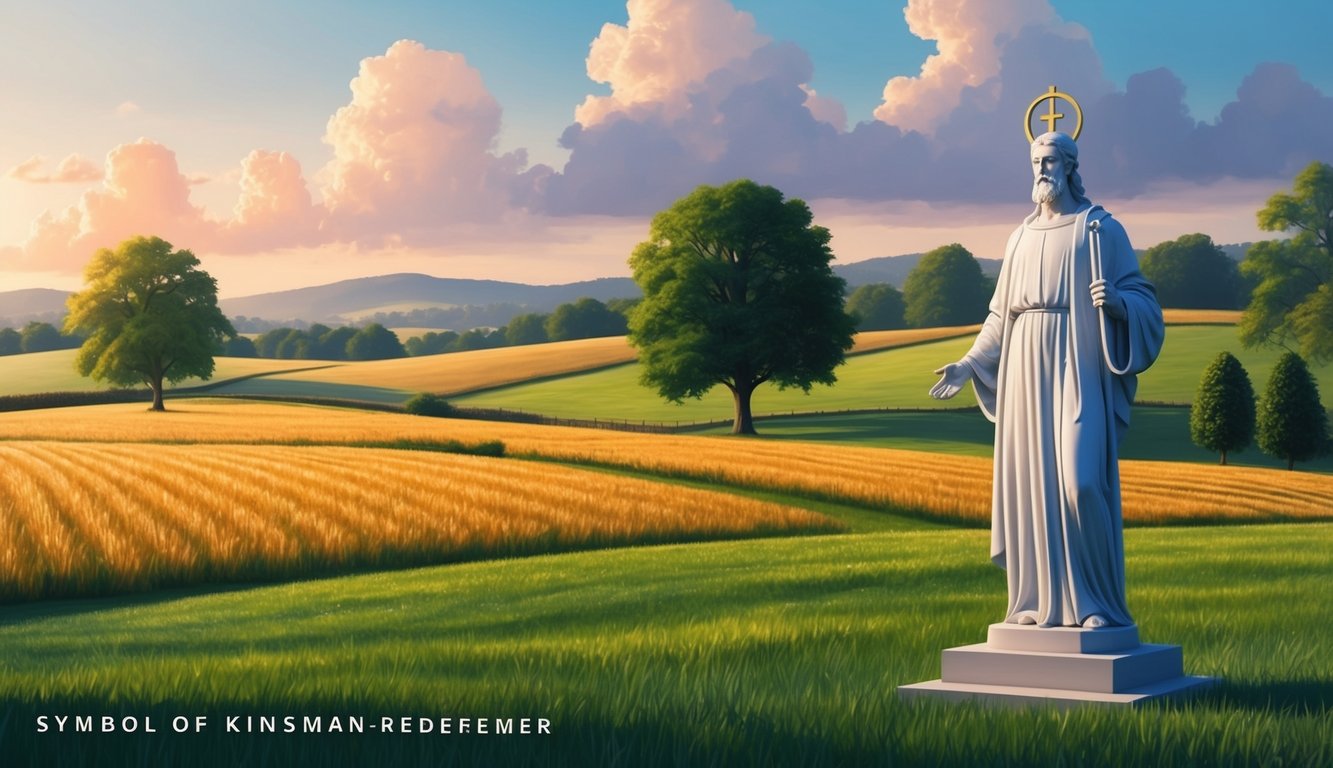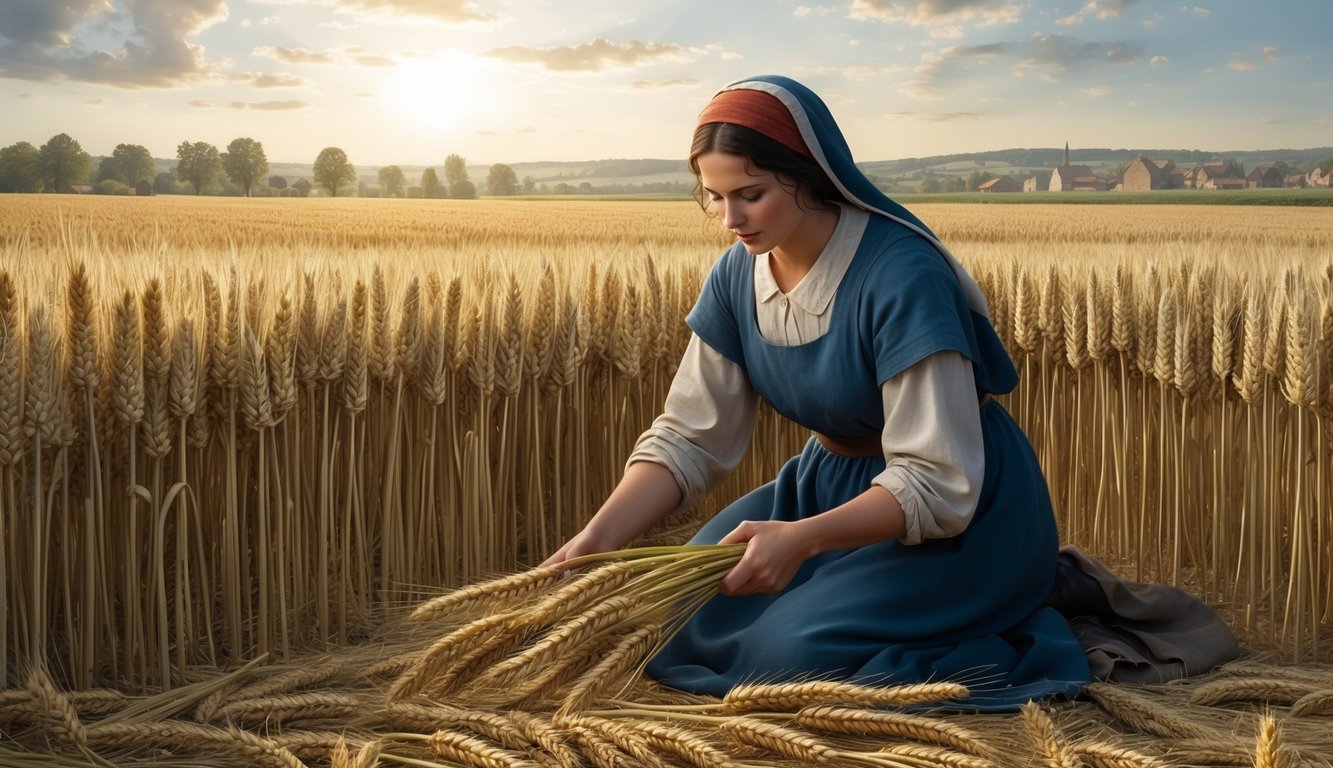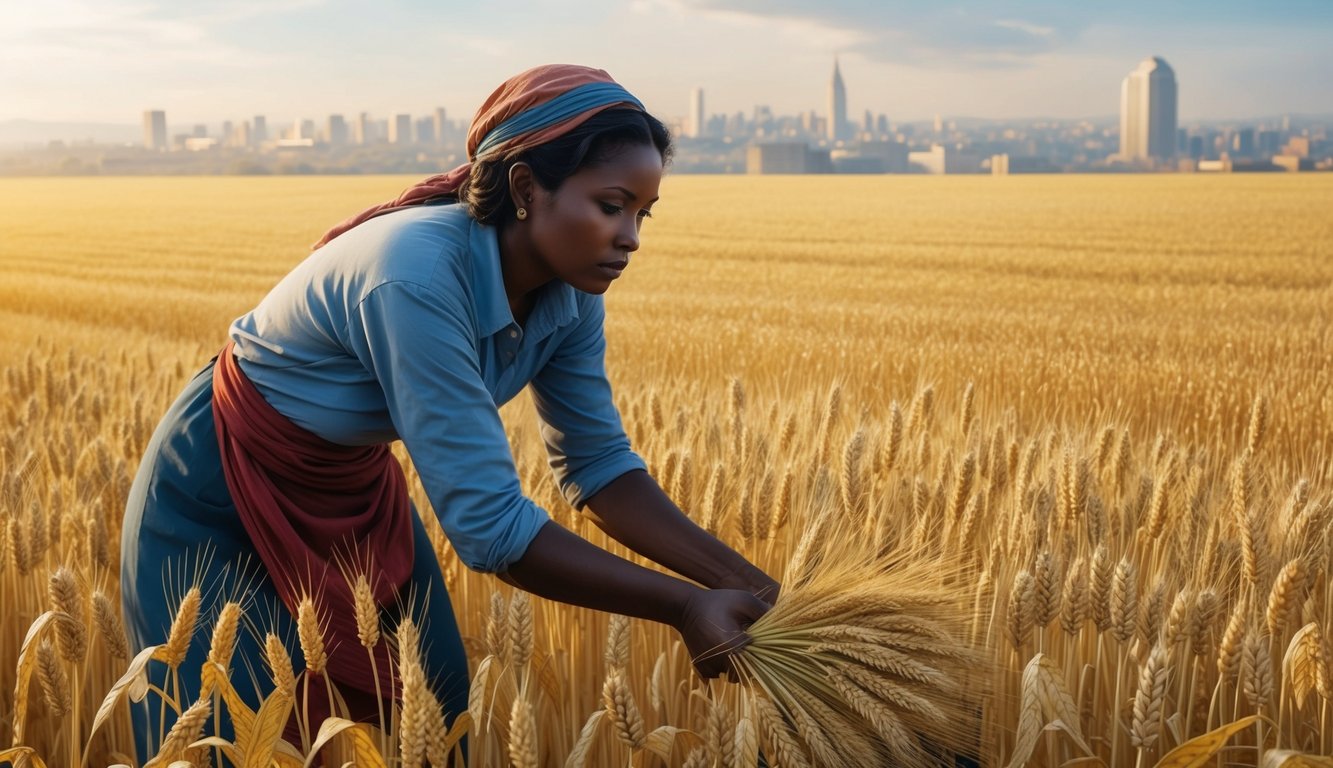Don’t Miss Out On This Unique Astrological Opportunity
Are you tired of spinning your wheels and getting nowhere? Simply put, you’re out of sync: you’re out of alignment with your astral configuration.
But: there’s a kind of map that can help you reclaim your alignment. Think of it as your own personal blueprint to success and happiness: a blueprint that will help you live your most amazing life.
Get started here.
The story of Ruth in the Bible is a tale of love, faith, and redemption that unfolds during a turbulent time.
Ruth, a Moabite woman, decides to embrace the faith of her mother-in-law, Naomi, after the death of her husband. Ruth’s devotion leads her to leave her homeland for Bethlehem, where she meets Boaz, who plays a key role in her journey toward redemption.
Ruth’s story showcases unwavering loyalty and the importance of family bonds.
As you explore her journey, you’ll discover her unique relationship with her mother-in-law, Naomi, and her encounter with Boaz, who acts as a kinsman-redeemer.
Boaz’s role helps highlight themes of kindness and faith.
As you dive deeper into Ruth’s narrative, notice its cultural and spiritual significance.
Her tale offers timeless lessons and stands as an inspiring example of how faith can bring love and hope even in the most challenging times.
Key Takeaways
- Ruth leaves her homeland for a new beginning in Bethlehem.
- Boaz acts as a kinsman-redeemer in Ruth’s journey.
- Ruth’s story is about love, loyalty, and faith.
Background and Setting
The story of Ruth is set during the time of the Judges, a turbulent period in Israel’s history.
You will explore a backdrop marked by a famine that forces a family to move from Bethlehem to Moab, and you’ll see how key relationships shape the narrative.
Historical Context
The story of Ruth unfolds during the era of the Judges, which was a time after the Israelites entered Canaan but before Israel had a king.
This period was marked by social and political instability.
Notably, a famine struck Bethlehem, pushing Naomi and her family to seek food in Moab.
Upon settling in Moab, Naomi’s sons married Moabite women, Ruth and Orpah.
However, tragedy struck when Naomi’s husband, Elimelech, and her two sons died.
This left Naomi, Ruth, and Orpah as widows.
The setting of the story highlights the struggles and choices faced by these women in a foreign land.
Key Characters and Relationships
The relationships in Ruth’s story are crucial.
Elimelech and Naomi initially moved to Moab with their two sons during a famine.
Their sons, Mahlon and Kilion, married Ruth and Orpah, respectively.
When Naomi decided to return to Bethlehem after her husband and sons’ deaths, Ruth displayed her loyalty by choosing to accompany her.
In contrast, Orpah remained in Moab.
Ruth’s friendship and dedication to Naomi are vital, showcasing strong family ties.
These relationships set the stage for Ruth’s later involvement with Boaz, a wealthy relative in Bethlehem.
Through these connections, you witness themes of loyalty and redemption.
Ruth’s Devotion
Ruth’s story is one of loyalty and kindness that has inspired many.
Her unwavering commitment to her mother-in-law, Naomi, and her hard work in the fields highlight her sincere devotion.
Her journey also introduces the concept of redemption, as she becomes an important part of Israel’s history.
Journey Back to Bethlehem
When Naomi decided to return to Bethlehem from Moab, Ruth chose to stay by her side, leaving her own homeland.
Ruth’s loyalty to her mother-in-law was profound.
As a Moabite woman, she faced the uncertainty of starting anew in a foreign land.
You see her devotion in how she promises to Naomi, “Where you go, I will go.” Her heart was full of kindness and commitment, determined to be with her mother-in-law.
This journey back was not just physical but also symbolic of Ruth’s acceptance and integration into Naomi’s people and faith.
Ruth in the Fields of Boaz
Upon arriving in Bethlehem, Ruth took the initiative to provide for herself and Naomi by gleaning in the fields during the harvest.
Gleaning was an act where the poor collected leftover grain.
Boaz, a relative of Naomi, showed kindness toward Ruth upon meeting her.
Boaz admired Ruth’s loyalty and allowed her to gather grain in his fields safely.
This opportunity was significant for Ruth, as Boaz ensured she had plenty.
His protection and generosity were a reward for her devotion and dedication to her mother-in-law.
The Concept of Redemption
Boaz’s role in Ruth’s life introduced the idea of redemption.
As a “kinsman-redeemer,” Boaz had the right to marry Ruth and restore Naomi’s family line.
His actions allowed Ruth and Naomi to find security and hope.
Boaz’s willingness to take on this role reflected God’s compassionate plan for redemption.
Through Boaz’s marriage to Ruth, the family lineage continued, eventually leading to the birth of Obed, David’s grandfather.
Thus, Ruth’s devotion became part of Israel’s larger story, illustrating redemption and renewal through acts of love and loyalty.
Boaz as Kinsman-Redeemer

Boaz plays a crucial role in Ruth’s story as her kinsman-redeemer.
This involves him taking on responsibilities that include generosity, a proper proposal, and securing a lineage that extends to King David.
Boaz’s Generosity
You might find Boaz’s generosity toward Ruth quite remarkable.
During the barley harvest, Boaz ensures Ruth can gather more than enough grain by instructing his workers to leave extra for her.
This act showcases his caring nature and adherence to the customs of helping the needy.
It wasn’t just about gleaning; Boaz also protected Ruth from harm, showing respect and kindness. Boaz’s actions reflected his understanding of the Torah’s call for compassion and generosity.
His generous acts went beyond obligation, illustrating his integrity and commitment.
Ruth’s Proposal
The proposal from Ruth to Boaz might surprise you with its boldness and significance.
Ruth approaches Boaz on the threshing floor during the harvest, asking him to spread his garment over her.
This gesture was a request for Boaz to fulfill his role as kinsman-redeemer by marrying her.
Ruth’s proposal was embedded in tradition and custom.
Boaz accepts with respect and honor, acknowledging her kindness and loyalty.
By agreeing, Boaz not only agrees to marry Ruth but also ensures that Naomi, Ruth’s mother-in-law, and Ruth are cared for, respecting the cultural practices of inheritance and family responsibility.
Marriage and Legacy
When Boaz marries Ruth, it marks the start of a significant and enduring legacy.
By marrying Ruth, Boaz secures the inheritance and lineage of Elimelech, Naomi’s deceased husband.
This marriage ensures the property and name stay within the family line, as outlined in the laws discussed in Leviticus.
The union between Boaz and Ruth leads to the birth of Obed, their son.
Obed becomes the grandfather of King David, anchoring Ruth’s story within the tribe of Judah.
This lineage is important in biblical tradition, as it is through this line that the Messiah, as foretold by various scriptures, is said to come.
Ruth and Boaz’s story is thus integral to the broader biblical narrative and holds lasting significance.
Themes and Relevance

The story of Ruth in the Bible is rich with themes that include love, faith, and social obligations.
It also highlights the significance of Ruth’s lineage in connection to the ancestry of Israel’s King David.
Love and Faith
Ruth’s journey showcases her deep love and unwavering faith.
She remains devoted to her mother-in-law, Naomi, choosing to stay with her despite the hardships.
This act of loyalty and faith mirrors the covenant relationships described in the Hebrew Bible.
You see the God of Israel rewarding Ruth’s steadfast devotion as her life unfolds.
Her story is a reminder of how faith can lead to blessings and redemption, forging bonds that go beyond bloodlines and cultural differences.
Through Ruth’s perseverance, she becomes part of a greater divine plan, illustrating how dedication and trust can bring unexpected blessings.
Her story also serves as a reflection for modern believers facing challenges, including the internal conflicts in Christian churches, reminding them that unity and faith can overcome divisions.
Ultimately, Ruth’s journey highlights the power of love, loyalty, and divine providence in transforming lives and communities.
Social Obligations and Kindness
In the story, social obligations and kindness are crucial elements.
Ruth and Naomi find themselves widowed and vulnerable, reliant on the kindness of others.
Ruth’s spirit of kindness in helping Naomi and Boaz’s response by protecting and providing for them are important acts in their society.
Their actions demonstrate how the Hebrew tradition values showing kindness and fulfilling obligations to one’s community and family, reflecting practices like those mentioned in the books of Ezra and Nehemiah.
The Ancestral Line of David
Ruth’s legacy is also tied to her role as the great-grandmother of King David, an important figure in Israel‘s history.
Boaz’s marriage to Ruth, an act of kindness, ensures Naomi’s family line continues.
This lineage is deeply significant, leading to the birth of David and ultimately connecting to the Messiah in Christian tradition.
The importance of Ruth’s story lies not just in her personal journey but in her enduring impact on biblical tradition and the history of Israel.
Frequently Asked Questions

Ruth’s story in the Bible is full of lessons about loyalty, faith, and kindness.
You can find inspiring stories about her relationships and key events in her life that may surprise you.
What are the key lessons that the Book of Ruth teaches us?
The Book of Ruth highlights important lessons such as loyalty, love, and the power of faith.
Ruth’s devotion to her mother-in-law, Naomi, shows unwavering commitment.
Her story also teaches us about God’s providence and how kindness and hard work can lead to blessings.
Can you summarize the relationship between Ruth and Naomi found in the scriptures?
Ruth and Naomi share a strong bond.
After the deaths of their husbands, Ruth chooses to stay with Naomi instead of returning to her own family.
Ruth’s famous promise to Naomi, “Where you go, I will go,” shows her loyalty and love.
This decision marks the beginning of their new journey together.
At what age did Ruth appear in the biblical narrative?
The Bible does not specify Ruth’s age when she comes into the narrative.
She is portrayed as a young woman of marrying age.
Although her exact age is not mentioned, her decisions reflect maturity and wisdom.
What significant events involve Ruth and Boaz in the Bible?
Ruth and Boaz’s significant events include their meeting during the barley harvest.
Ruth works in Boaz’s fields, and he shows her kindness.
Eventually, Ruth approaches Boaz to seek protection.
Boaz then marries Ruth, which leads to the birth of their son, Obed, who becomes an ancestor of King David.
For what virtues and actions is Ruth most well-known within the biblical context?
Ruth is well-known for her loyalty, kindness, and hard work.
Her decision to stay with Naomi and care for her is a testament to her compassion.
Her willingness to work in the fields and her respectful approach to Boaz show her dedication and humility.
How does Ruth’s story conclude in the Bible?
Ruth’s story concludes with her marrying Boaz.
Together, they have a son named Obed.
This child later becomes the grandfather of King David, placing Ruth in the lineage of Jesus.
Her story ends on a note of joy and fulfillment, showing how loyalty and faith are rewarded.



